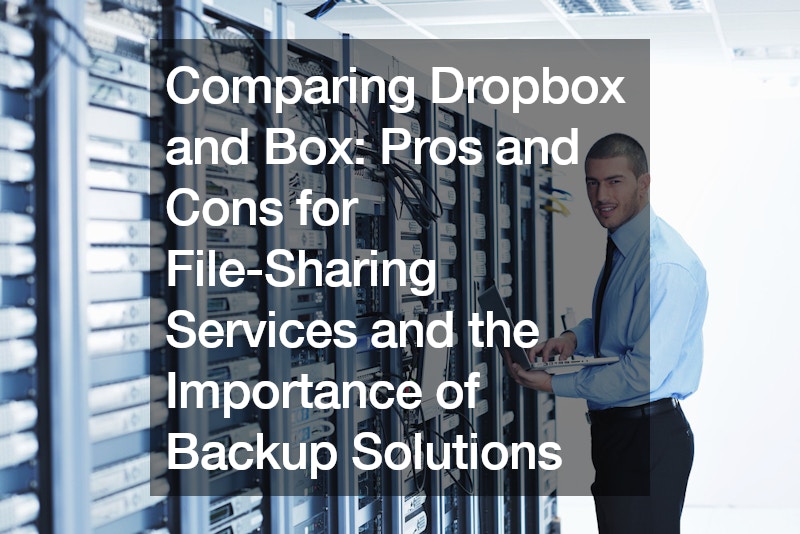In the ever-evolving landscape of digital collaboration, choosing the right file-sharing service is crucial for individuals and teams alike. Two prominent players in this arena are Dropbox and Box, each offering distinct features tailored to different needs. Let’s delve into the pros and cons of these platforms to help you make an informed decision for your file-sharing requirements. Additionally, we’ll explore the critical importance of backup solutions in safeguarding your valuable data.
Dropbox: Streamlined and Versatile
Dropbox, at its core, is designed with a primary focus on individuals but extends its services to businesses as well. The platform boasts a myriad of features that make file management seamless and versatile.
One of its key strengths is the wide range of uses for stored files. Teams can easily assign files to teammates or third parties, add essential notes, set due dates, and even attach files to calendar invites, streamlining collaborative efforts.
Security is a paramount concern in the digital realm, and Dropbox takes this seriously. The platform offers top-notch security features to safeguard confidential information and stored files. This includes robust measures like two-factor authentication and advanced sharing controls, ensuring that sensitive data remains in safe hands.
For teams on a budget, Dropbox presents an attractive option with affordable plans starting under $10 per month. This competitive pricing makes it an accessible choice for small to medium-sized teams looking for an effective file-sharing solution without breaking the bank.
However, the journey with Dropbox is not without its hurdles. The primary downside lies in the complexity of setting up enterprise accounts. Partners often find themselves navigating through intricate and large-scale deployment processes, which can be a significant challenge for those unfamiliar with the platform. Despite this, once the setup is complete, Dropbox proves to be a reliable and feature-rich file-sharing service.
Box: Security-Centric and Enterprise-Ready
On the other side of the spectrum, Box positions itself as a file-sharing app tailored for larger organizations and teams. This doesn’t mean it neglects individual users; Box offers free individual plans, but its marketing efforts lean towards serving the needs of more extensive groups.
Box shines in its commitment to security, making it an appealing choice for organizations dealing with sensitive data. The platform provides impressive security features, allowing users to encrypt files and offering tools to ensure GDPR compliance. This focus on data protection sets Box apart, especially for businesses with stringent security requirements.
One notable advantage of Box is the availability of customized assistance from experts. Companies can enlist the services of Box experts and specialists to enhance existing processes and seamlessly integrate Box into current workflows. This personalized support can be invaluable, particularly for organizations with complex operations that demand tailored solutions.
Budget-conscious teams will also find Box appealing, thanks to its offering of free and inexpensive plans. This commitment to accessibility ensures that organizations of varying sizes can benefit from Box’s secure file-sharing services without straining their finances.
However, Box has its limitations, particularly concerning its free and lower-cost plans. These restrictions are more stringent compared to competitors, limiting access to certain features. Individuals testing the waters with Box might find themselves unable to explore many features with an individual plan, which could be a potential drawback for those seeking a comprehensive box & Dropbox backup solution.
Importance of Backup Solutions
Amidst the discussion of file-sharing services, it’s crucial to emphasize the paramount importance of backup solutions. Regardless of whether you opt for Dropbox or Box, having a robust backup strategy is non-negotiable in today’s digital landscape.
Data loss can occur due to various reasons, including hardware failures, accidental deletions, or even malicious attacks. Without a reliable backup solution in place, organizations risk losing critical information, leading to operational disruptions, financial losses, and damage to their reputation.
A comprehensive backup solution ensures that your data is protected from unforeseen events. It serves as a safety net, allowing you to restore lost or corrupted files, maintaining business continuity. In the context of file-sharing services, such as Dropbox and Box, a dedicated box & Dropbox backup strategy adds an extra layer of security.
Both Dropbox and Box offer some level of versioning and recovery options, allowing users to revert to previous file states. However, these features may have limitations, and relying solely on them might not be sufficient in the face of complex data loss scenarios.
In conclusion, while evaluating file-sharing services like Dropbox and Box, it’s crucial to parallelly consider the significance of implementing a robust backup solution. The right combination of a reliable file-sharing platform and a comprehensive backup strategy ensures that your organization’s data remains secure, accessible, and resilient in the face of unforeseen challenges. Make informed choices, prioritize data security, and fortify your digital infrastructure for a more resilient and productive future.
.


